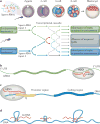Epigenetic inheritance of acquired traits through sperm RNAs and sperm RNA modifications
- PMID: 27694809
- PMCID: PMC5441558
- DOI: 10.1038/nrg.2016.106
Epigenetic inheritance of acquired traits through sperm RNAs and sperm RNA modifications
Abstract
Once deemed heretical, emerging evidence now supports the notion that the inheritance of acquired characteristics can occur through ancestral exposures or experiences and that certain paternally acquired traits can be 'memorized' in the sperm as epigenetic information. The search for epigenetic factors in mammalian sperm that transmit acquired phenotypes has recently focused on RNAs and, more recently, RNA modifications. Here, we review insights that have been gained from studying sperm RNAs and RNA modifications, and their roles in influencing offspring phenotypes. We discuss the possible mechanisms by which sperm become acquisitive following environmental-somatic-germline interactions, and how they transmit paternally acquired phenotypes by shaping early embryonic development.
Conflict of interest statement
The authors declare no competing interests.
Figures






References
-
- Landman OE. The inheritance of acquired characteristics. Annu Rev Genet. 1991;25:1–20. - PubMed
-
- Ost A, et al. Paternal diet defines offspring chromatin state and intergenerational obesity. Cell. 2014;159:1352–1364. - PubMed
-
- Ng SF, et al. Chronic high-fat diet in fathers programs β-cell dysfunction in female rat offspring. Nature. 2010;467:963–966. - PubMed
Publication types
MeSH terms
Substances
Grants and funding
LinkOut - more resources
Full Text Sources
Other Literature Sources

